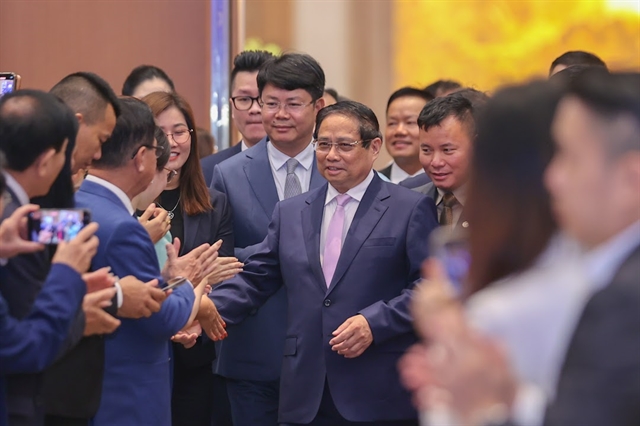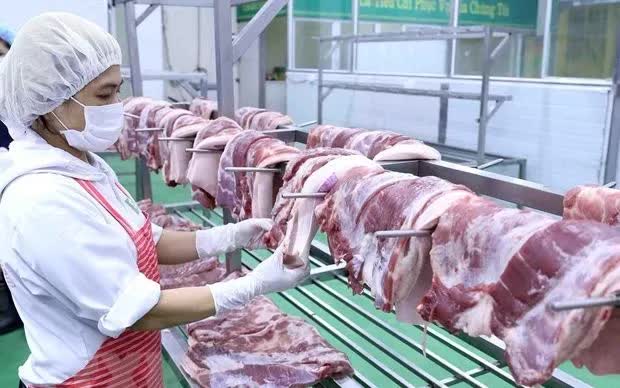 Economy
Economy

 |
| Prime Minister Phạm Minh Chính attended and chaired a dialogue with businesses and business associations to effectively implement Resolution 68. — Photo VGP |
HÀ NỘI — Prime Minister Phạm Minh Chính on May 31 chaired a dialogue with enterprises and business associations to effectively implement Resolution No.68-NQ/TW on the private economy’s development.
PM Chính said that after the Politburo issued Resolution 68, the Government submitted to the National Assembly a proposal to issue Resolution 198 on specific mechanisms and policies to promote private economic development.
The Government subsequently issued its own programme and action plan to implement the resolution.
The PM emphasised that the resolutions are already comprehensive and well-coordinated. The most desired now is to organise implementation effectively, guided by the spirit of ‘thinking deeply and acting boldly.’
It also needs to find the most efficient approaches to unlock the potential of nearly one million enterprises and five million household businesses.
He called for clearly defining the roles and responsibilities of the State, local authorities, businesses and citizens in implementing the resolution.
PM Chính also urged unity and coordination with the spirit: “When the Party has provided direction, the Government is committed, the National Assembly agrees, the people are supportive and the country is hopeful, we only discuss how to act, not whether to retreat.”
At the dialogue, Minister and Chairman of the Government Office Trần Văn Sơn announced the decision to establish the National Steering Committee for the implementation of Resolution 68-NQ/TW.
Enterprises and business associations expressed their commitment to operating in compliance with the law, fostering business ethics and a healthy business culture, eliminating opportunistic and illegal practices, renewing their business mindset and enhancing their capabilities.
“If everyone joins hands with the Government in fully and faithfully implementing the policies that have been set out, I believe all enterprises will grow. That is also a global trend,” Mai Kiều Liên, CEO of Vinamilk, said.
Delegates also hoped for continued support from the Government to facilitate business and production development.
“The State should soon develop and issue a special mechanism for science and technology enterprises in the agricultural sector, including policies on land, credit, tax and training; and amend the Law on Crop Production to align it with other laws,” Trần Mạnh Báo from Thái Binh Seed Group said.
He also suggested establishing innovation support funds and developing a mechanism for cooperation and technology transfer between the public and private sectors.
The dialogue was held in person and live-streamed at the headquarters of the People’s Committees of provinces and cities. Over 1,000 delegates representing businesses, business associations, household businesses and cooperatives attended.
Just before the dialogue, the PM performed the button-pressing ceremony to launch the National Law Portal, marking a new era of legal support for citizens and businesses.
Resolution No.68-NQ/TW underscores that the private economy is one of the most important driving forces of the national economy.
According to Phạm Nguyễn Toan, vice president of the Việt Nam Real Estate Association, the core spirit is recognising private enterprises as strategic partners of the State for social development.
The new policy no longer views businesses as mere subjects of regulation, but as stakeholders who share responsibility and help shape the future.
"Private enterprises will no longer be bystanders to strategic infrastructure projects. They can become the leading forces executing key national projects if entrusted and empowered with appropriate mechanisms," Toan said.
He added that it is the consistent message of Resolution 68, which encourages the private sector to participate in vital areas if they meet the conditions.
Nguyễn Văn Khôi, president of the Việt Nam Real Estate Association, said the priority is to address institutional bottlenecks and guarantee rights that enable private economic development. For example, it is essential to thoroughly remove administrative procedure obstacles.
"Việt Nam’s economy is very open and integrated, but we must pay attention to our internal capabilities. This is critically important, as we’ve seen how recent global developments have disrupted FDI inflows,” Hoàng Văn Cường, a member of the National Assembly's Economic and Financial Committee.
He highlighted that at such times, the private sector must step up and demonstrate its pivotal role in sustaining the economy. — BIZHUB/VNS




